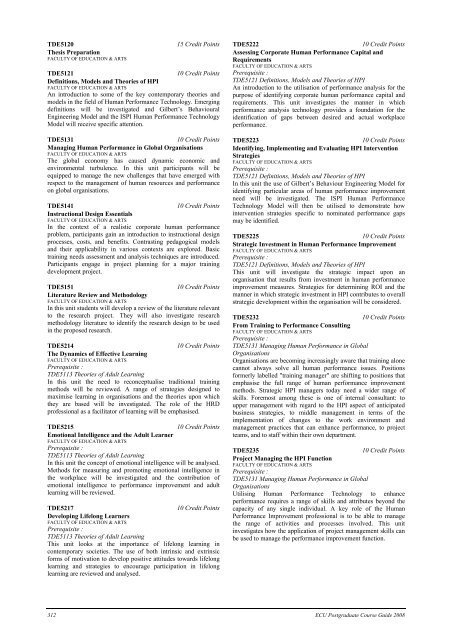Postgraduate - Edith Cowan University
Postgraduate - Edith Cowan University
Postgraduate - Edith Cowan University
Create successful ePaper yourself
Turn your PDF publications into a flip-book with our unique Google optimized e-Paper software.
TDE5120 15 Credit Points<br />
Thesis Preparation<br />
FACULTY OF EDUCATION & ARTS<br />
TDE5121 10 Credit Points<br />
Definitions, Models and Theories of HPI<br />
FACULTY OF EDUCATION & ARTS<br />
An introduction to some of the key contemporary theories and<br />
models in the field of Human Performance Technology. Emerging<br />
definitions will be investigated and Gilbert’s Behavioural<br />
Engineering Model and the ISPI Human Performance Technology<br />
Model will receive specific attention.<br />
TDE5131 10 Credit Points<br />
Managing Human Performance in Global Organisations<br />
FACULTY OF EDUCATION & ARTS<br />
The global economy has caused dynamic economic and<br />
environmental turbulence. In this unit participants will be<br />
equipped to manage the new challenges that have emerged with<br />
respect to the management of human resources and performance<br />
on global organisations.<br />
TDE5141 10 Credit Points<br />
Instructional Design Essentials<br />
FACULTY OF EDUCATION & ARTS<br />
In the context of a realistic corporate human performance<br />
problem, participants gain an introduction to instructional design<br />
processes, costs, and benefits. Contrasting pedagogical models<br />
and their applicability in various contexts are explored. Basic<br />
training needs assessment and analysis techniques are introduced.<br />
Participants engage in project planning for a major training<br />
development project.<br />
TDE5151 10 Credit Points<br />
Literature Review and Methodology<br />
FACULTY OF EDUCATION & ARTS<br />
In this unit students will develop a review of the literature relevant<br />
to the research project. They will also investigate research<br />
methodology literature to identify the research design to be used<br />
in the proposed research.<br />
TDE5214 10 Credit Points<br />
The Dynamics of Effective Learning<br />
FACULTY OF EDUCATION & ARTS<br />
Prerequisite :<br />
TDE5113 Theories of Adult Learning<br />
In this unit the need to reconceptualise traditional training<br />
methods will be reviewed. A range of strategies designed to<br />
maximise learning in organisations and the theories upon which<br />
they are based will be investigated. The role of the HRD<br />
professional as a facilitator of learning will be emphasised.<br />
TDE5215 10 Credit Points<br />
Emotional Intelligence and the Adult Learner<br />
FACULTY OF EDUCATION & ARTS<br />
Prerequisite :<br />
TDE5113 Theories of Adult Learning<br />
In this unit the concept of emotional intelligence will be analysed.<br />
Methods for measuring and promoting emotional intelligence in<br />
the workplace will be investigated and the contribution of<br />
emotional intelligence to performance improvement and adult<br />
learning will be reviewed.<br />
TDE5217 10 Credit Points<br />
Developing Lifelong Learners<br />
FACULTY OF EDUCATION & ARTS<br />
Prerequisite :<br />
TDE5113 Theories of Adult Learning<br />
This unit looks at the importance of lifelong learning in<br />
contemporary societies. The use of both intrinsic and extrinsic<br />
forms of motivation to develop positive attitudes towards lifelong<br />
learning and strategies to encourage participation in lifelong<br />
learning are reviewed and analysed.<br />
TDE5222 10 Credit Points<br />
Assessing Corporate Human Performance Capital and<br />
Requirements<br />
FACULTY OF EDUCATION & ARTS<br />
Prerequisite :<br />
TDE5121 Definitions, Models and Theories of HPI<br />
An introduction to the utilisation of performance analysis for the<br />
purpose of identifying corporate human performance capital and<br />
requirements. This unit investigates the manner in which<br />
performance analysis technology provides a foundation for the<br />
identification of gaps between desired and actual workplace<br />
performance.<br />
TDE5223 10 Credit Points<br />
Identifying, Implementing and Evaluating HPI Intervention<br />
Strategies<br />
FACULTY OF EDUCATION & ARTS<br />
Prerequisite :<br />
TDE5121 Definitions, Models and Theories of HPI<br />
In this unit the use of Gilbert’s Behaviour Engineering Model for<br />
identifying particular areas of human performance improvement<br />
need will be investigated. The ISPI Human Performance<br />
Technology Model will then be utilised to demonstrate how<br />
intervention strategies specific to nominated performance gaps<br />
may be identified.<br />
TDE5225 10 Credit Points<br />
Strategic Investment in Human Performance Improvement<br />
FACULTY OF EDUCATION & ARTS<br />
Prerequisite :<br />
TDE5121 Definitions, Models and Theories of HPI<br />
This unit will investigate the strategic impact upon an<br />
organisation that results from investment in human performance<br />
improvement measures. Strategies for determining ROI and the<br />
manner in which strategic investment in HPI contributes to overall<br />
strategic development within the organisation will be considered.<br />
TDE5232 10 Credit Points<br />
From Training to Performance Consulting<br />
FACULTY OF EDUCATION & ARTS<br />
Prerequisite :<br />
TDE5131 Managing Human Performance in Global<br />
Organisations<br />
Organisations are becoming increasingly aware that training alone<br />
cannot always solve all human performance issues. Positions<br />
formerly labelled "training manager" are shifting to positions that<br />
emphasise the full range of human performance improvement<br />
methods. Strategic HPI managers today need a wider range of<br />
skills. Foremost among these is one of internal consultant: to<br />
upper management with regard to the HPI aspect of anticipated<br />
business strategies, to middle management in terms of the<br />
implementation of changes to the work environment and<br />
management practices that can enhance performance, to project<br />
teams, and to staff within their own department.<br />
TDE5235 10 Credit Points<br />
Project Managing the HPI Function<br />
FACULTY OF EDUCATION & ARTS<br />
Prerequisite :<br />
TDE5131 Managing Human Performance in Global<br />
Organisations<br />
Utilising Human Performance Technology to enhance<br />
performance requires a range of skills and attributes beyond the<br />
capacity of any single individual. A key role of the Human<br />
Performance Improvement professional is to be able to manage<br />
the range of activities and processes involved. This unit<br />
investigates how the application of project management skills can<br />
be used to manage the performance improvement function.<br />
312 ECU <strong>Postgraduate</strong> Course Guide 2008



